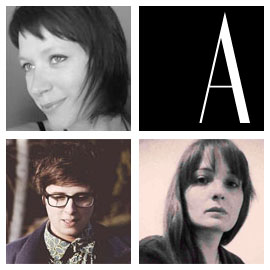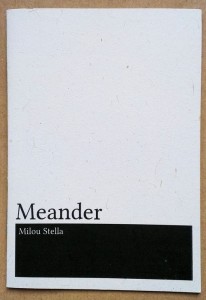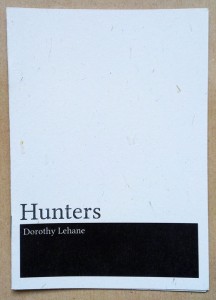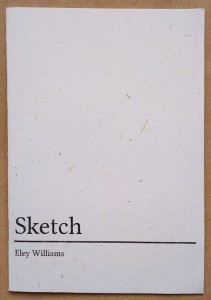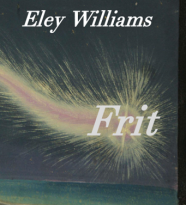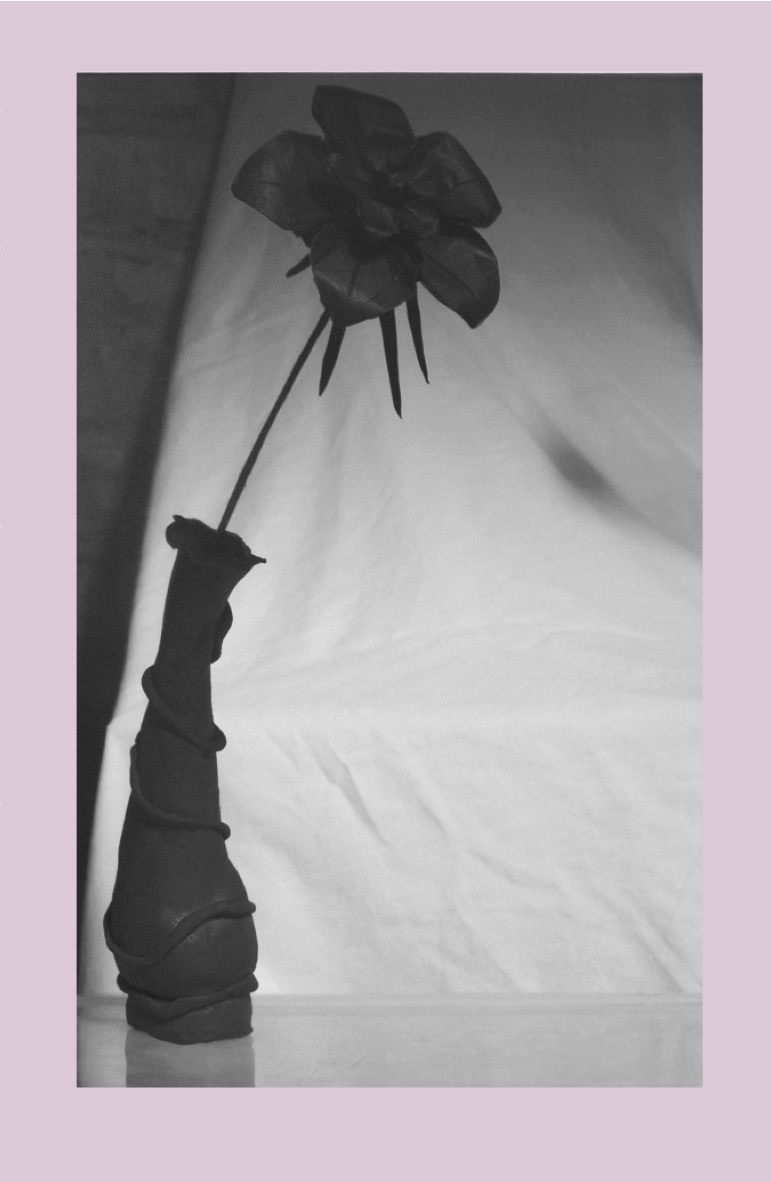Annexe Introducing: Meander by Milou Stella, Hunters by Dorothy Lehane, Sketch by Eley Williams
-Reviewed by Charles Whalley–
I reviewed pamphlets from the first series of Annexe Introducing pamphlets in February of last year. Happily and deservedly, Charlotte Newman’s Selected Poems went on to win Best Pamphlet in the 2013 Saboteur Awards. With three further pamphlets by Milou Stella, Dorothy Lehane, and Eley Williams, Annexe is certainly establishing itself as a route to exposure for talented London-based writers, the publications’ small size giving a quick, attractive sample of work.
Meander by Milou Stella
Meander is a numbered sequence of poems punctuated by illustrations and split by titled poems, one of which is ‘Yours’:
The marionettes you played with all your life
will die too,
entwined, uncoordinated
in the kitchen by the hob, where
the cloths are kept
clean, in order.
Those for the plates you ate on,
those for your favourite cutlery
used for your knife – the one only you can use,
the one that is put on the table –
by your pills.
Every lunch, every dinner
unshakably yours.Have it.
No one ever tried to take it from you.
Like the rest of the pamphlet, the poem’s trajectory is certainly a ‘meander’, facing forwards but sliding laterally, from “marionettes” to “cloths” then from “cloths” to “your knife”. This comes from the syntax; for instance, “those” in the seventh line presumably refers to “the cloths”, changing the subject from marionettes to the cloths. Similarly, from “unshakably yours” onwards the speaker slips from the cloths to talking about “your knife”. As such, each part of the poem has a dramatic intention a few feet to the left of the prior section. The final lines, with their ponderousness, feel as if we have looked up and found ourselves in a different poem entirely.
These poems meander as if walking home from the pub; things move in and out of focus, intoxicating and baffling, their pleasure dependent on one’s willingness to surrender the destination. They work best when there is something to hold on to, or when they are too short to get too far lost. The untitled poem preceding ‘Yours’ runs:
I put my grandfather in a box.
He looked harmless there in
his psychopath garden.
Its brevity works very well — “psychopath garden” is tremendous – and, indeed, all of Stella’s poems are strong in their constituent units. Similarly, ‘4’ controls the wandering by repetition of the construction “Let London” [verb]. Elsewhere, though, the pamphlet, especially in its longer poems, staggers sideways too much, with, as in ‘Yours’ above, the end of a poem seemingly having no interest in its start. This is at least a consistent aesthetic throughout, atmospheric rather than particularly capable, powerful if often directionless. In this regard, these poems feel a bit like outsider art, as their dreamy disregard for the movements a poem will conventionally take is useful but ultimately limiting.
Hunters by Dorothy Lehane
Whilst the appearances of astronomy in poetry are typically as metaphors for experience, in Hunters Lehane instead attempts a sort of cosmic portraiture. Despite the awesome subject, it’s a tricky endeavour; poetic language doesn’t have much traction on the stars, as the only words we have specifically for astronomy are scientific, and anything else are approaches through terrestrial metaphor, a bunch of uncertain rockets. Hunters sets out to give us poems about nebulae, supernovas, planets, habitable cosmic zones, and mostly gives us poems about mixtapes, owls, Inuits and abattoirs instead. For the most part, this gives us dense poetry with a sort of crossword appeal, such as ‘Crab Nebula’, which begins:
Haven’t we been through this:
stellar cinders in AD 1054,
corpse pervading with new engine isotopes
decaying but forging still;
unlikely Lazarus, celestial zombie
speak easy dynamo, forge anew:
nature abhors a vacuum,
islands, scale, high-point,
guest star in Tiānguān;
faint yellow glimmer
first year of the Zhihe era
A sizeable proportion of the poem is riddles, the answer each time being ‘the crab nebula’, with allusions to the Bible and Macbeth, as the poem approaches astronomy via the cultural history of celestial omens. It’s pleasing when it connects together, but often feels a little unsatisfying. With little rhythmic felicity, it’s hard to shake the feeling here, and elsewhere, that almost every part of the poem is bent to another purpose, which, when inaccessible, leaves us with almost nothing.
Take, for instance, these lines from the poem ‘AE Aurigae’:
In a bluish K-class, Aurigae
would have looked different
if his mother weaved his shell
with honey
It seems unlikely that any poem could accommodate the idea ‘weave a shell with honey’, which doesn’t link up however which way you test it. I suspect here, as Lehane does elsewhere, these are simply visual metaphors as signalled by “looked different”, but the image is too muddled for me to make anything out of it. Or, in ‘Hunters’, there is the line:
forget abuse, or ventricle, forget asthma
It’s hard to understand what this is getting at. Better is Lehane’s poem ‘Dark Heart’, nominally about a black hole, where, in the latter half of the poem, we have one single, consistent image:
on the underground
two women sign to each other
Makaton in their mouths
bodies full instrument
de-constructing codewe, the carriage
silent like understudies
deaf in the wings
or swallowed, as though
all relevance has been sucked out
Rather than shooting off for a moon in every line, the poem grounds its celestial subject in an image (of watching deaf women sign to each other in a sign language the observer doesn’t understand) with persistence and some emotional heft.
In relating to the astronomical themes, Lehane’s customary mode of increasingly tight wordplay and allusions serves to float words free from their roots (which is a worthwhile activity!), but often without then succeeding to connect them in any new, meaningful ways. At times something does emerge out of the murk that is pleasing on its own terms, as in ‘Keyhole (NGC1999)’ or most of ‘Supernova’, but Hunters is often frustrating.
Dorothy Lehane reading Goldilock Zone
It’s worth noting here that Dorothy Lehane is also one of the editors behind Litmus Publishing, “a new press exploring the interaction between poetry and science” which is currently seeking submission of full length collections.
Sketch by Eley Williams
Sketch is narrated by an unnamed “courtroom artist”, who, in his guilt from furtively leaving someone’s flat the morning after a date, draws her in the place of someone in court. The story jumps between the present case, as the artist sketches his portrait, and the events around the date, with clever pacing. The date at the pub gives a pretext for Williams to have her narrator ruminate on his work and how he goes about it, which furnishes some of the best parts of the pamphlet, such as:
Everyone always looks like they’ve slept badly. If I was entirely honest in my drawings, I would run out of blue pastels for the shadows beneath everybody’s eyes: I’d run out of blue for the eyelids first, then white for all the hands twisting themselves into blurred, worried polygons in pinstriped laps.
In all, it’s a very witty and cleverly-written piece, with one brilliant passage wherein the narrator gives the “visual details” of his date, as he customarily memorises them in the Old Bailey:
- Dimples – parenthetical
- Forehead – the villain’s bull terrier in Oliver!
- Freckles on your forearm – sleet rather than blizzard
- Eyelashes – ski-jump
- Mouth – Holly Hunter; Justin Theroux; my mother would say it was cruel; ballot-box tick marks on ClipArt
- Thumbnails – squared-off given the length of finger; the word ‘bucktoothed’ seems oddly appropriate
- Hands – big, cf. Soviet propaganda poster’s welder or Tom of Finland back-catalogue; tiger cubs; moor hens
- Angle of chin to neck – grebes; Modigliani
- Nose – crumplable; Harold Loeb
- Gestures used when describing the recent rain – Windows98 manicule cursor; Verrocchio’s Christ and St. Thomas
Similarly, the pamphlet has many sharp lines and amusing gestures towards the narrator’s past, and is an entertaining read before anything else. Indeed, it’s hard to shake the impression that the character is more entertaining than the story. And beyond the slight suggestion that the character is a little odd – he meets his date after following her off the Tube, supposedly to confirm if he correctly guessed her occupation – he doesn’t seem to be in any great conflict. The pamphlet’s wit and liveliness does come at the expense of any significant crisis or resolution. Its final line (“We are all worth so much more than a brief character sketch”) relates quite pertinently to the narrator, as Sketch, itself a neat portrait of a single character, only suffers from not having the opportunity to be longer.

